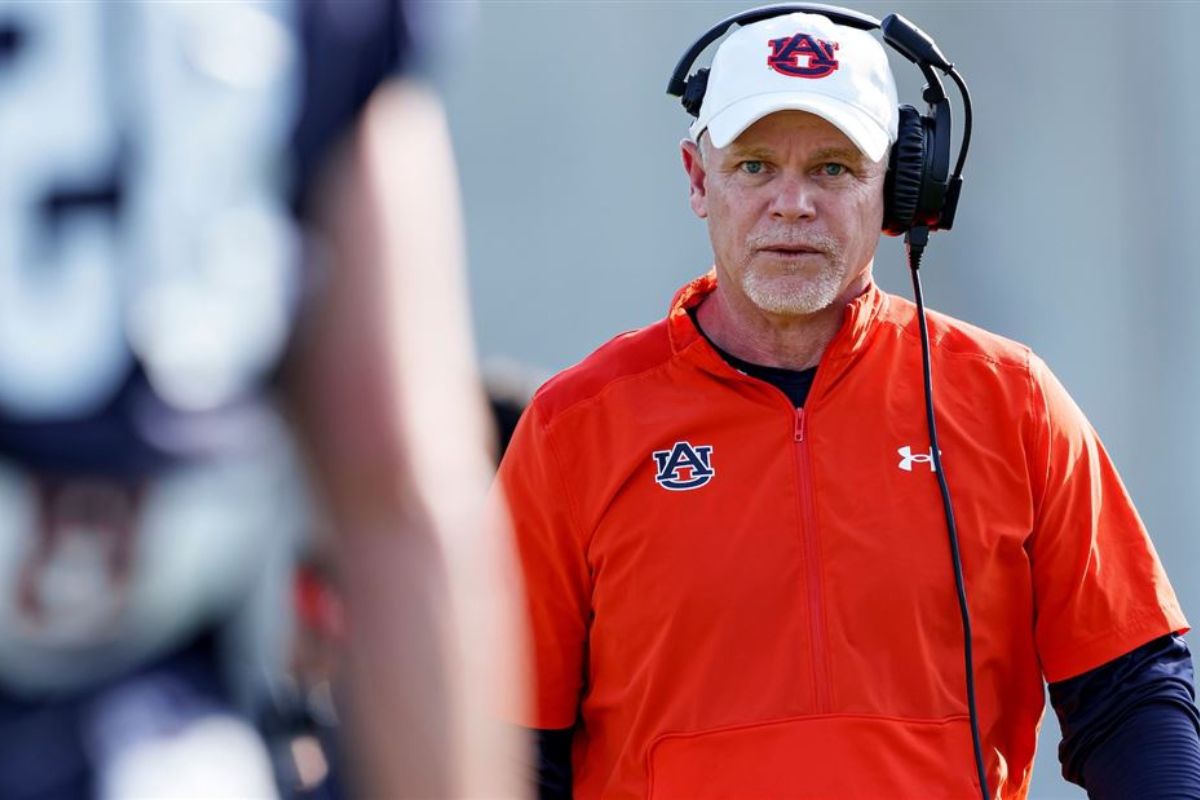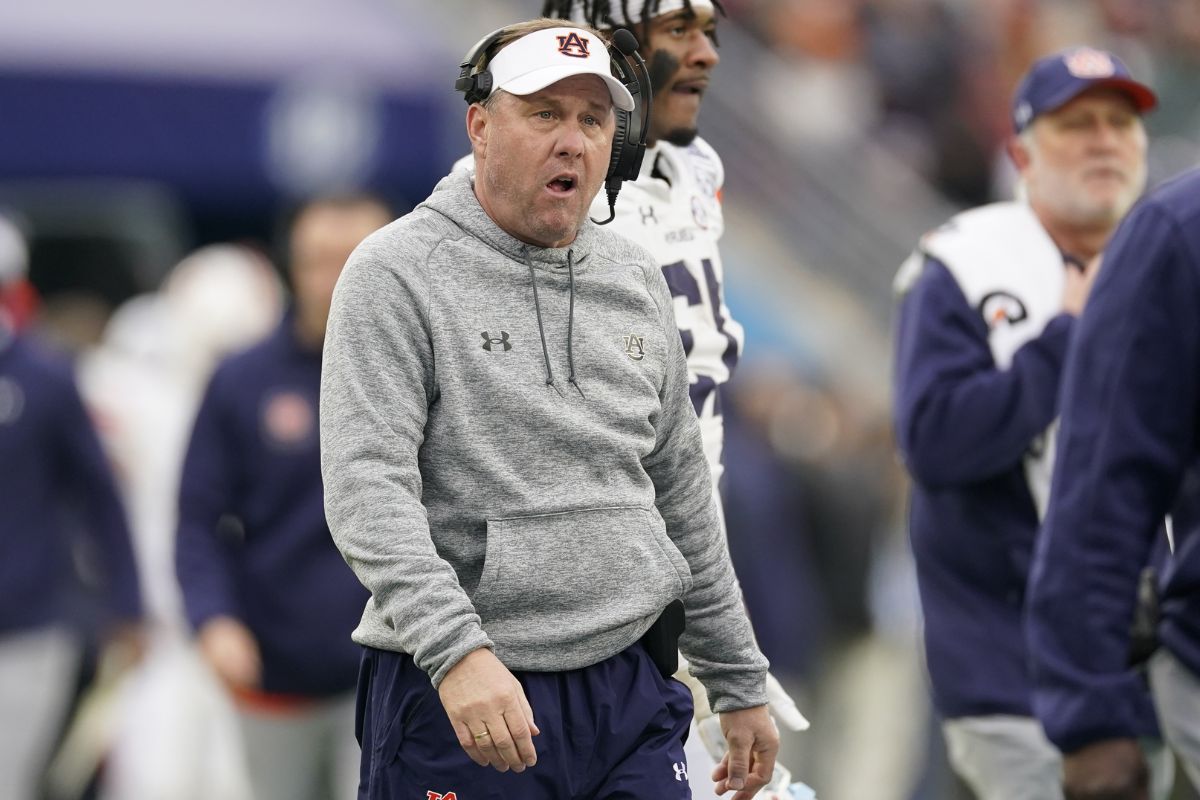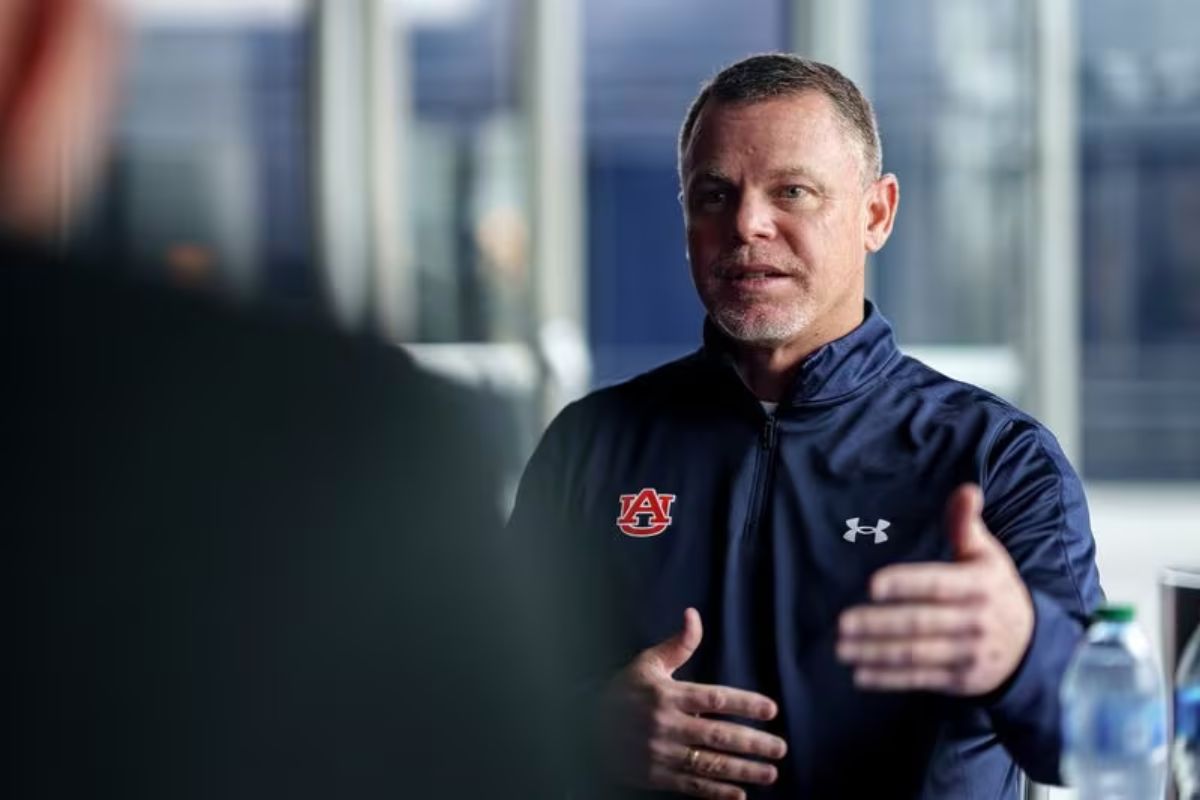Offensive Coordinator Philip Montgomery: Auburn University has announced the departure of Offensive Coordinator Philip Montgomery following just one season.
This decision comes after a series of performance struggles and changing roles within the team. Montgomery’s tenure was marred by passing woes and challenges with the quarterback position, as well as coaching issues that escalated over time.
Head Coach Hugh Freeze’s decisive actions and thorough evaluation process led to this decision.
The circumstances surrounding Montgomery’s departure and the implications for the team’s future success.
Key Takeaways
- Philip Montgomery’s departure from Auburn was primarily due to his struggles in leading the team’s offensive strategy and the lackluster performance of the offense.
- The passing game was a major challenge for Auburn, with inconsistency in quarterback play, inaccuracy, and decision-making issues, as well as limited chemistry with receivers and offensive line struggles.
- Coaching issues, including failures in setting protections, ensuring correct routes, and maintaining a proper lineup, escalated over time and were highlighted in Auburn’s loss to Ole Miss.
- Auburn’s administration and coaching staff had high expectations for Montgomery’s tenure, but his inability to adapt and improve the offensive performance led to his dismissal after just one season.
Auburn University Parts Ways with Offensive Coordinator Philip Montgomery
The decision to part ways with offensive coordinator Philip Montgomery at Auburn University has been officially announced by head coach Hugh Freeze.
Montgomery’s dismissal comes after a short stint since his hiring in December 2022, following his termination as the head coach of Tulsa.
This decision reflects the university’s desire for a change in offensive strategy and direction. Despite Montgomery’s previous success at Tulsa, his tenure at Auburn did not meet the expectations set by the coaching staff and administration.
The decision to let go of Montgomery underscores the commitment of Auburn University to continuously evaluate and improve its coaching staff to ensure a competitive and successful football program.
With this move, the university aims to find a new offensive coordinator who can bring a fresh perspective and lead the team to greater achievements on the field.

ALSO READ: Alabama Season Long Offensive Issues Stand Out in Rose Bowl Defeat to Michigan
Performance Struggles and Changing Roles
Despite being initially brought in to serve as Auburn’s primary play caller, Offensive Coordinator Philip Montgomery’s tenure was marred by performance struggles and changing roles.
Montgomery’s lackluster showing against Texas A&M, where Auburn managed only three points, prompted Head Coach Freeze to take a more involved role in the offense. This change in responsibilities highlighted Montgomery’s inability to effectively lead the team’s offensive strategy.
As the season progressed, it became clear that Auburn’s offense was underperforming and failing to meet expectations. The decision to part ways with Montgomery after just one season was a result of his inability to adapt and improve the team’s offensive performance.
It is crucial for any coordinator to demonstrate the skills and expertise necessary to effectively lead an offense, and unfortunately, Montgomery fell short in this regard.
Passing Woes and Quarterback Challenges
Amidst the struggles in Auburn’s passing game, Offensive Coordinator Philip Montgomery faced significant challenges with the quarterbacks and their performance. The passing offense’s poor ranking in yards per game reflected the difficulties faced by the team.
The following were the key issues encountered:
- Lack of consistency in quarterback play: The rotation between Payton Thorne and Robby Ashford hindered the development of a cohesive passing attack.
- Inaccuracy and decision-making: Both Thorne and Ashford struggled with accuracy, leading to missed opportunities and turnovers.
- Limited chemistry with receivers: The quarterbacks and receivers failed to establish a strong connection, resulting in miscommunication and missed targets.
- Pressure and sacks: The offensive line’s struggles contributed to increased pressure on the quarterbacks, leading to sacks and disrupted passing plays.
Addressing these challenges will be crucial for Auburn’s future success in the passing game.

Coaching Issues and Escalating Problems
Addressing the coaching issues and escalating problems has become imperative for Auburn’s offensive success moving forward. The offensive struggles experienced by the team have been primarily attributed to coaching failures, including the inability to properly set protections, ensure correct routes, and maintain a proper lineup.
These issues have been highlighted by the head coach, Freeze, during press conferences, where he consistently pointed out the coaching failures. The climax of these problems was evident during Auburn’s loss to Ole Miss, where the team had a meager 26 passing yards entering the fourth quarter.
As a result, the decision to axe Offensive Coordinator Philip Montgomery after just one season was made, indicating the seriousness of the coaching issues. It is crucial for Auburn to address these problems promptly and effectively to ensure future offensive success.
Freeze’s Decisive Actions and Evaluation Process
Following the decision to axe Offensive Coordinator Philip Montgomery after just one season, Head Coach Freeze took decisive actions and initiated an evaluation process to address the coaching issues and ensure future offensive success at Auburn.
Recognizing the importance of a strong offensive performance, Freeze implemented the following measures:
- Engaged in a thorough assessment of the offensive coaching staff, identifying areas for improvement and potential replacements.
- Conducted player evaluations to determine strengths, weaknesses, and areas of growth within the offensive unit.
- Collaborated with the remaining coaching staff to develop a comprehensive offensive strategy that aligns with the team’s goals and strengths.
- Prioritized recruiting efforts to secure top talent that fits the desired offensive scheme.
Freeze’s decisive actions and commitment to evaluating and improving the offensive coaching staff and strategy illustrate his dedication to revitalizing Auburn’s offense and achieving future success.
Conclusion Of Offensive Coordinator Philip Montgomery
Auburn University has decided to part ways with offensive coordinator Philip Montgomery due to performance struggles, passing woes, and coaching issues.
The decision was made by head coach Freeze after an evaluation process. Montgomery’s one-season tenure was marked by escalating problems and quarterback challenges.
This decisive action by Freeze reflects the university’s commitment to addressing and improving the team’s offensive performance.
Also Read: State Treasurer Young Boozer Rejected Birmingham Southern $30 Million Loan Request
Our Reader’s Queries
Where did Philip Montgomery go?
On December 14, 2022, Philip Montgomery, the former head coach of the University of Tulsa for eight seasons, was appointed as the offensive coordinator and quarterbacks coach at Auburn.
How much does Philip Montgomery make?
Montgomery had a contract until 2025, earning a guaranteed $1 million per year. He had previously worked as a coordinator at Baylor and Houston before a 43-53 stint at Tulsa.
Who is the offensive coordinator for the University of Alabama?
In February 2023, Tommy Rees signed on with Nick Saban’s team at The University of Alabama. He’s taking on the role of offensive coordinator and quarterbacks coach for the Crimson Tide.
Who is the offensive coordinator for the Oregon Duck?
Born on September 25, 1989, Will Stein is an American football coach serving as the offensive coordinator and quarterbacks coach at the University of Oregon.

